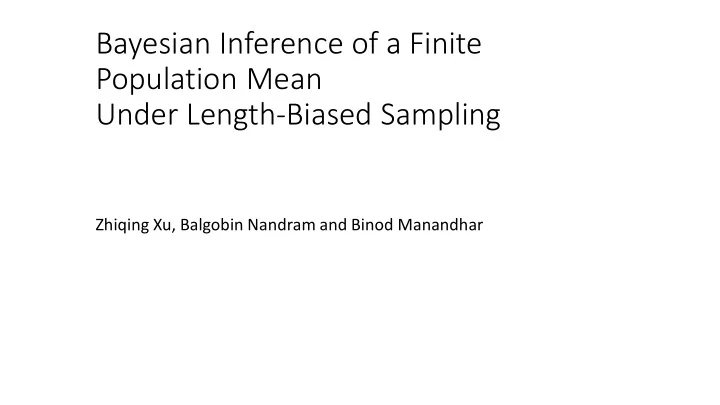

Bayesian Inference of a Finite Population Mean Under Length-Biased Sampling Zhiqing Xu, Balgobin Nandram and Binod Manandhar
Estimating regrowth in a quarry • 2 sets of three transects • We count n from a finite population N • Sampling biased towards large x
Bayesian methodology • Distribution of shrubs as a function of width (GG) 𝑔(𝑦|𝛽, 𝛾, 𝛿) • Probability of counting, given width x 𝑦 𝑥 𝑔 𝑦 𝑄 𝑦 𝐽 = 1 = 𝑦 𝑥 𝑔 𝑦 d𝑦 • Bayes → Generalised gamma with new parameters. 𝛽 𝑐𝑗𝑏𝑡 = 𝛽 + 1 𝛿 , 𝛾 𝑐𝑗𝑏𝑡 = 𝛾, 𝛿 𝑐𝑗𝑏𝑡 = 𝛿
Estimating the finite size distribution • Best estimate of N (Horvitz-Thompson) 𝑜 1 𝑂 = 𝑥 𝑦 𝑗 𝑗=1 • Assuming 𝑄 𝑜 𝑗 𝑂 𝑗 ~𝐶𝑗𝑜𝑝𝑛𝑗𝑏𝑚(𝑂 𝑗 , 𝜈 0 ) • Using Bayes yields negative binomial distribution
Parameter estimation • Bayes applied to find posterior for parameters 𝐻𝐻 𝑦 𝛽, 𝛾, 𝛿 𝜌 𝛽, 𝛾, 𝛿 𝜌 𝛽, 𝛾, 𝛿 𝑦 = 𝐻𝐻 𝑦 𝛽, 𝛾, 𝛿 𝜌 𝛽, 𝛾, 𝛿 d𝛽d𝛾d𝛿 • Noninformative priors used • Reduces effects from over fitting. • Can be sampled using Markov-Chain MC or similar sampling schemes
ҧ Density 𝑦 𝛿 𝛽 Density 𝛾 3 𝛾 2 𝛾 1
Summary • Biased model fit yields better LH than unbiased • Better sampling algorithms makes the sampling more effective • Plans to include covariates in the analysis
Recommend
More recommend